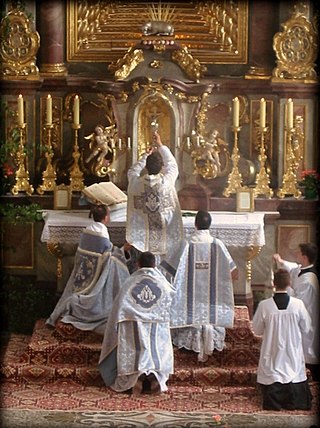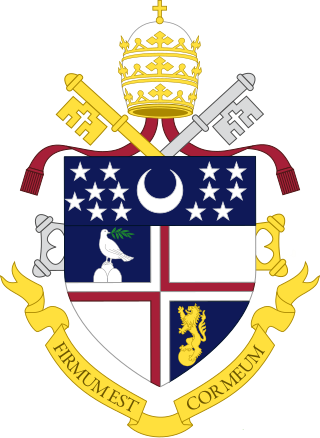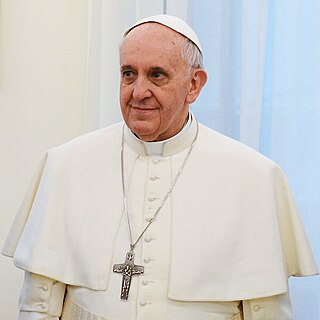
The Holy See, also called the See of Rome, Petrine See or Apostolic See, is the jurisdiction of the pope in his role as the bishop of Rome. It includes the apostolic episcopal see of the Diocese of Rome, which has ecclesiastical jurisdiction over the worldwide Catholic Church and sovereignty over the city-state known as the Vatican City.

The pope, also known as the supreme pontiff, Roman pontiff or sovereign pontiff, is the bishop of Rome, head of the worldwide Catholic Church, and has also served as the head of state or sovereign of the Papal States and later the Vatican City State since the eighth century. From a Catholic viewpoint, the primacy of the bishop of Rome is largely derived from his role as the apostolic successor to Saint Peter, to whom primacy was conferred by Jesus, who gave Peter the Keys of Heaven and the powers of "binding and loosing", naming him as the "rock" upon which the Church would be built. The current pope is Francis, who was elected on 13 March 2013.

Pope Paul VI was head of the Catholic Church and sovereign of the Vatican City State from 21 June 1963 to his death in August 1978. Succeeding John XXIII, he continued the Second Vatican Council, which he closed in 1965, implementing its numerous reforms. He fostered improved ecumenical relations with Eastern Orthodox and Protestant churches, which resulted in many historic meetings and agreements. In January 1964, he flew to the Hashemite Kingdom of Jordan. This was the first time a reigning pontiff had flown on an airplane, the first papal pilgrimage to the Holy Land, and the first time a Pope had left Italy in more than a century.

Vatican City, officially the Vatican City State, is a landlocked independent country, city-state, microstate, and enclave within Rome, Italy. It became independent from Italy in 1929 with the Lateran Treaty, and it is a distinct territory under "full ownership, exclusive dominion, and sovereign authority and jurisdiction" of the Holy See, itself a sovereign entity under international law, which maintains the city-state's temporal power and governance, diplomatic, and spiritual independence.

Pope Benedict XVI was the head of the Catholic Church and sovereign of the Vatican City State from 19 April 2005 until his resignation on 28 February 2013. Benedict's election as pope occurred in the 2005 papal conclave that followed the death of Pope John Paul II. Benedict chose to be known as "Pope emeritus" upon his resignation, and he retained this title until his death in 2022.

The Dicastery for the Doctrine of the Faith (DDF) is the oldest among the departments of the Roman Curia. Its seat is the Palace of the Holy Office in Rome. It was founded to defend the Catholic Church from heresy and is the body responsible for promulgating and defending Catholic doctrine.

Bernard Francis Law was an American cardinal of the Catholic Church, known largely for covering up the serial rape of children by Catholic priests. He served as Archbishop of Boston, archpriest of the Basilica di Santa Maria Maggiore, and Cardinal Priest of Santa Susanna, which was the American parish in Rome until 2017, when the American community was relocated to San Patrizio.

Traditionalist Catholicism is a movement encompassing members of the Catholic Church and offshoot groups of the Catholic Church that emphasizes beliefs, practices, customs, traditions, liturgical forms, devotions and presentations of teaching associated with the Catholic Church before the Second Vatican Council (1962–65). Traditionalist Catholics particularly emphasize the Tridentine Mass, the Roman Rite liturgy largely replaced in general use by the post-Second Vatican Council Mass of Paul VI.

The Vatican Apostolic Library, more commonly known as the Vatican Library or informally as the Vat, is the library of the Holy See, located in Vatican City, and is the city-state's national library. It was formally established in 1475, although it is much older—it is one of the oldest libraries in the world and contains one of the most significant collections of historical texts. It has 75,000 codices from throughout history, as well as 1.1 million printed books, which include some 8,500 incunabula.

The Vatican Apostolic Archive, formerly known as the Vatican Secret Archive, is the central repository in the Vatican City of all acts promulgated by the Holy See.

The Catholic Church, also known as the Roman Catholic Church, is the largest Christian church, with 1.378 billion baptized Catholics worldwide as of 2021. It is among the world's oldest and largest international institutions, and has played a prominent role in the history and development of Western civilization. The church consists of 24 sui iuris churches, including the Latin Church and 23 Eastern Catholic Churches, which comprise almost 3,500 dioceses and eparchies located around the world. The pope, who is the bishop of Rome, is the chief pastor of the church. The Diocese of Rome, known as the Holy See, is the central governing authority of the church. The administrative body of the Holy See, the Roman Curia, has its principal offices in Vatican City, a small independent city-state enclave within the Italian capital city of Rome, of which the pope is head of state.
The canon law of the Roman Catholic Church requires that clerics "observe perfect and perpetual continence for the sake of the kingdom of heaven". For this reason, priests in Roman Catholic dioceses make vows of celibacy at their ordination, thereby agreeing to remain unmarried and abstinent throughout their lives. The 1961 document entitled Careful Selection and Training of Candidates for the States of Perfection and Sacred Orders stated that homosexual men should not be ordained. In 2005, the Church clarified that men with "deeply rooted homosexual tendencies" cannot be ordained. The Vatican followed up in 2008 with a directive to implement psychological screening for candidates for the priesthood. Conditions listed for exclusion from the priesthood include "uncertain sexual identity" and "deep-seated homosexual tendencies".

Pope Francis is the head of the Catholic Church, the bishop of Rome and sovereign of the Vatican City State. He is the only pope to be a member of the Society of Jesus (Jesuits), the only one from the Americas, the only one from the Southern Hemisphere, and the only one born or raised outside Europe since the 8th-century papacy of the Syrian Pope Gregory III.

The Pontifical North American College (NAC) is a Roman Catholic educational institution in Rome, Italy, that prepares seminarians to become priests in the United States and elsewhere. The NAC also provides a residence for priests who are pursuing graduate work at other pontifical universities in Rome. The NAC also has a continuing education program for veteran priests.

Raniero Cantalamessa is an Italian Catholic cardinal and priest in the Order of Friars Minor Capuchin and a theologian. He has served as the Preacher to the Papal Household since 1980, under Pope John Paul II, Pope Benedict XVI and Pope Francis.
The Catholic Church condemns same-sex sexual activity and denies the validity of same-sex marriage. While the Church says it opposes "unjust" discrimination against homosexual persons, it supports what it considers "just" discrimination in the employment of teachers or athletic coaches, in adoption, in the military and in housing. The Catechism of the Catholic Church promulgated by Pope John Paul II considers sexual activity between members of the same sex to be a grave sin against chastity and sees homosexual attraction as objectively disordered. However, the Catechism also states that homosexuals "must be accepted with respect, compassion, and sensitivity". This teaching has developed through papal interventions, and influenced by theologians, including the Church Fathers.

Pietro ParolinOMRI is an Italian prelate of the Catholic Church. A cardinal since February 2014, he has served as the Vatican's Secretary of State since October 2013 and a member of the Council of Cardinal Advisers since July 2014. Before that, he worked in the diplomatic service of the Holy See for thirty years, where his assignments included terms in Nigeria, Mexico and Venezuela, as well as more than six years as Undersecretary of State for Relations with States.

The Personal Ordinariate of the Chair of Saint Peter is a Latin Church ecclesiastical jurisdiction or personal ordinariate of the Catholic Church for Anglican converts in the United States and Canada. It allows these parishioners to maintain elements of Anglican liturgy and tradition in their services. The ordinariate was established by the Vatican in 2012.

A conclave was convened on 12 March 2013 to elect a pope to succeed Benedict XVI, who had resigned on 28 February. 115 participating cardinal-electors gathered. On the fifth ballot, the conclave elected Cardinal Jorge Mario Bergoglio, SJ, Archbishop of Buenos Aires. He took the pontifical name Francis.

Elected on 13 March 2013, Francis is the first member of the Society of Jesus to be appointed pope and the first non-European to hold the office since the 8th century. He described his papal name as pointing to what he wants to emulate in Saint Francis of Assisi: to have a poor church, for the poor, always going out to the margins, and to show concern for the natural environment. His papal motto Miserando atque eligendo contains a central theme of his papacy, God's mercy, which has led to conflict with orthodox Catholics on issues such as reception of Communion by remarried Catholics. In addressing real life situations he often appeals directly to his experience, in continuity with his synodal way, which showed a renewed emphasis on listening and dialogue. He has placed greater emphasis on church synods and on widespread consultation and dialogue, uplifting the roles of laypersons and of women in the Catholic church and criticizing clericalism.















